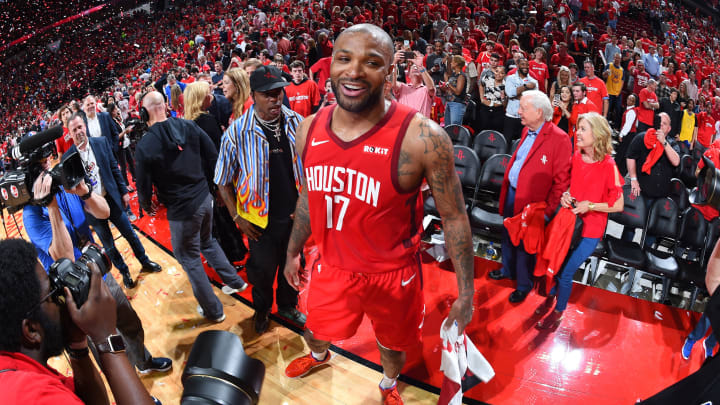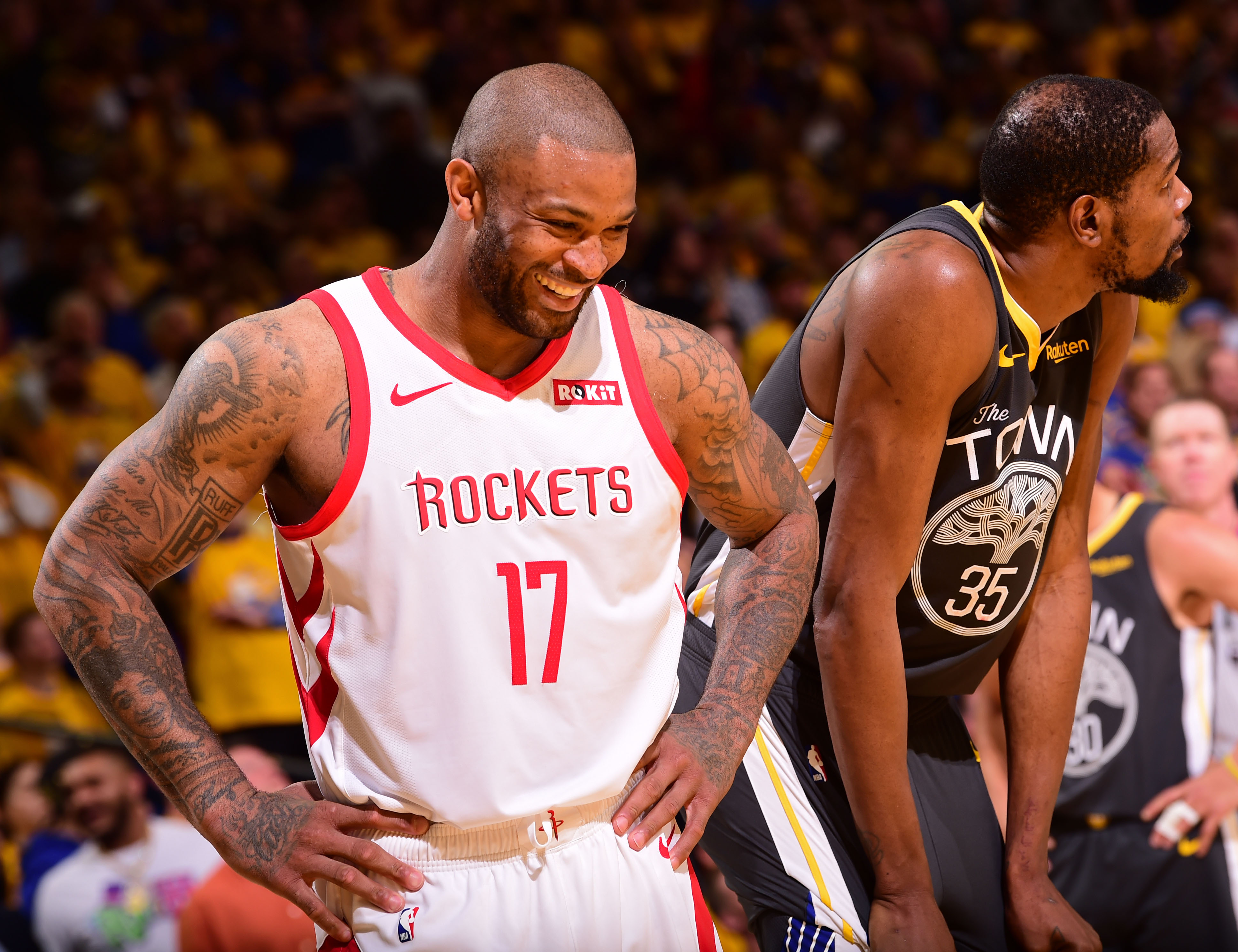The Last Line of Defense: P.J. Tucker Does It All for the Rockets

HOUSTON — Somehow, working as Earth’s last, best line of defense against the living supernova that is Kevin Durant has become a mere part of P.J. Tucker’s job description. The ongoing series between the Rockets and Warriors is, in a certain sense, beyond matchups; both defenses do so much switching as to jumble the court, shaping games through their own calculated dance of risk management. It’s more important to Houston’s coverage to stay attached than to keep specific pairings intact. So Tucker will guard Stephen Curry, or Draymond Green, or whomever his circumstances demand. Going round after round with Durant may be his most memorable work, but the reality is that Tucker has been the primary defender on Durant for only about a third of his shot attempts in this series, per NBA.com.
“It's just one of those things, man,” Tucker says. “You can't lock in on one guy.”
Instead, Tucker jams up the entire floor. When James Harden steps up to guard Durant off a switch—a regular occurrence in Games 2 and 3, in particular—he is effectively propped up by Tucker’s help. The second line of defense looms. There is little any defense can do to prevent Durant from hoisting a jumper over his defender’s head. What they can do is make Durant think twice about a hard drive by edging into his path off of select matchups. Unless he’s staffed to Curry or Klay Thompson, Tucker has leaned hard into Durant’s potential driving lanes in an effort to actively shape his thinking. “Guarding him,” Tucker says, “is just a small piece to a big puzzle.”

The edge is in the nuance. Any defender could abandon Andre Iguodala in the corner to offer help elsewhere. Leveraging that freedom to the fullest advantage is where things get more complex—and where defenders like Tucker actualize their value. Screening Tucker off of Durant doesn’t take him out of a play so much as shift his perspective on it. If his new matchup allows him some room to wander, the Rockets benefit from the well-placed help of one of the sharpest positional defenders in the league. What distinguishes Tucker from even his well-schooled peers is how carefully he minds the counters he knows are coming. Golden State is well aware of how defenses treat its lesser threats, and Tucker is wise to the way the Warriors create problems by using those lesser threats as off-ball screeners.
“You're trying to help, but it's hard with them because they have really good shooters,” Tucker says. “Even the guys who can't shoot, they pick away for a wide open shot.” Even when matched up elsewhere, Tucker at the very least allows his teammates to make their necessary rotations. So much of what the Warriors run is designed to open up smaller, two-on-one scenarios on the weak side. Tucker is the best one-on-two defender Houston has: a clever thinker with quick hands and the frame of a refrigerator.
When coaches finds their defense lacking a certain physicality, they will often implore their players: Make the offense feel you. Tucker manages this even without making actual contact. You can see the gears turning in Durant’s head when he catches Tucker out of the corner of his eye. Scorers like Curry will actively turn down the chance to create against him, one-on-one. You feel where Tucker is on the floor because he digs in and comes up with plays, even when he doesn’t seem to be directly involved. It’s telling that Houston has only been able to hold Golden State to a manageable level of scoring in this series when Tucker has been on the floor.
“We say it all the time: Tuck doesn't do any of the glamorous stuff,” Chris Paul said. “All the stuff he does doesn't show up in the stat sheet... He could easily be one of the most valuable guys on our team just because of the way he plays. He plays hard, and it forces you to do the same.”
To Paul’s point: In Game 1, Tucker may have registered the most impactful zero-point performance on record. The most important contribution he made in Game 2 (in which he logged a 13 and 10 double-double) may have been his 41 minutes. Without them, Houston would never have closed the game to a competitive margin. Game 3 was his best effort yet: a seven-point, 12-rebound Tucker spectacular, in which every bucket and board was more powerful than his stat line could ever convey. It was Tucker who allowed the Rockets to play as small as needed while still almost single-handedly resolving the team’s rebounding woes.
Houston played hard for the first two games in Oakland. But it was Tucker who said they could play harder, and then proved it. No possession better captured the urgency of Game 3 than Tucker’s venture into the paint in the fourth quarter, where he banged into Green in attempt to clear room only to have the ball stripped, gathered it only to have his follow-up shot blocked, and recovered it for a hook shot (and a foul) from a crowd of Warriors. This sort of grind is a part of the Tucker brand, but his efforts here are elevated by their stakes. If Tucker doesn’t pull down every one of his 12 rebounds, Houston might have lost Game 3 outright, and in effect, the series. Every installment of this series will require of Tucker that same resolution, with no satisfaction short of seeing it through.
“I won't get any joy out of winning two or three games,” he says. “Unless we win the series, we fail.”
